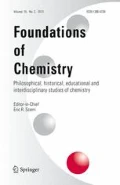The 14th meeting of the International Society for the Philosophy of Chemistry was held in Oxford, a place where one of the founders of the corpuscularian approach to science, Robert Boyle, once plied his trade. One of the papers given at this meeting, by Marina Banchetti-Robino, opens this latest issue. The central claim that she puts forward is that corpuscularian theory does not entail a strictly mechanistic and reductionist account of chemical properties.
Another paper read at the same meeting was by the organizer, Rom Harré, who asks whether explanations in chemistry depend on event causality, à la Hume and Mackie, rather than agent causality.
Questions surrounding phlogiston, caloric and the chemical revolution continue to exercise the minds of scholars in the history and philosophy of chemistry. One of the specialists in this area is Mi Gyung Kim who focuses here on changing notions of “chemical bodies” across the chemical revolution.Footnote 1
Turning to matters of contemporary chemistry, the following paper is by Geoffrey Rayner Canham, an expert in inorganic chemistry and the author of books on descriptive inorganic chemistry. In his article in this issue Rayner Canham attempts to establish some natural groupings among certain sets of transition metals, which frequently fly in the face of the simplistic notions of group behavior that might be expected from the periodic table.
The final full length article was co-authored by the two organizers of the most recent ISPC meeting that was held in Bogota, Colombia but actually delivered earlier at the Coburg meeting. Guillermo Restrepo and José Luis Villaveces discuss what they call “chemistry a lingua franca”. The general idea is that Lavoisier’s program for chemistry meets the conditions of Leibniz for building a lingua philosophica and hence the notion that Lavoisier provided us with a chemical lingua philosophica.
Geoffrey Rayner Canham, mentioned above, and his wife Marelene, have written a number of books and articles on women in science. Here in a book review they consider a recent biography of Ellen Gleditsch, a radiochemist who had the distinction of working with Marie Curie in Paris as well as with Bertrand Boltwood at Yale.Footnote 2
Notes
For another recent and interesting article in this area see, Lewowicz (2011).
I have often wondered why the field of the discovery of the elements in the 20th century, attracted a number of women. This includes Marie Curie (discoverer of Po and Ra), Ida Noddack (discoverer of Re), Lise Meitner (discoverer of Pa and nuclear fission) and Marguerite Perey (discoverer of Fr) to name just a few.
.
Reference
Lewowicz, L.: Phlogiston, Lavoisier and the purloined referent. Stud. Hist. Philos. Sci. 42, 436–444 (2011)
Author information
Authors and Affiliations
Corresponding author
Rights and permissions
About this article
Cite this article
Scerri, E. Editorial 39. Found Chem 13, 171–172 (2011). https://doi.org/10.1007/s10698-011-9138-5
Published:
Issue Date:
DOI: https://doi.org/10.1007/s10698-011-9138-5

